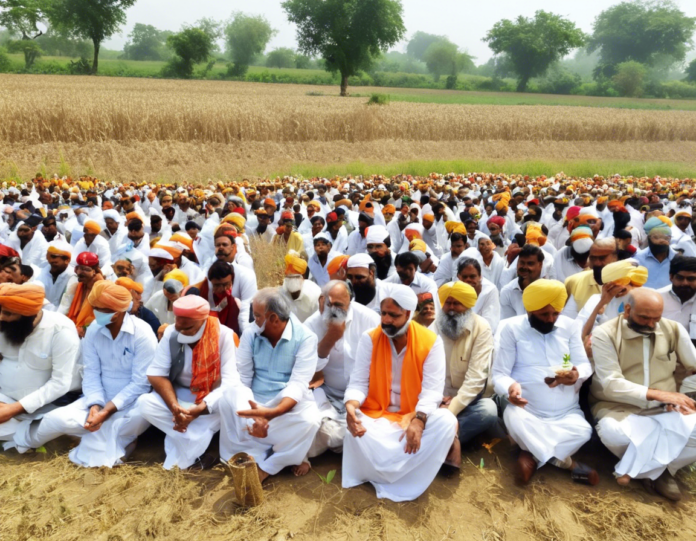The Kisan Andolan Movement has gained significant attention in recent times, sparking widespread discussions and protests across India. Farmers, primarily from Punjab, Haryana, and Uttar Pradesh, have been demonstrating against the implementation of three new agricultural laws passed by the Indian government. The movement, which began in September 2020, has escalated into one of the largest protests in recent history, with farmers demanding the repeal of the controversial laws and legal assurance of minimum support prices (MSP) for their produce.
Background of the Kisan Andolan Movement
The three contentious farm laws at the center of the agitation are the Farmers’ Produce Trade and Commerce (Promotion and Facilitation) Act, the Farmers (Empowerment and Protection) Agreement on Price Assurance and Farm Services Act, and the Essential Commodities (Amendment) Act. These laws were passed by the Indian government in September 2020 with the aim of liberalizing agricultural trade and providing more options for farmers to sell their produce. However, the farmers argue that the laws will lead to the dismantling of the mandi system and leave them vulnerable to exploitation by large corporates.
Key Issues and Demands of the Protesting Farmers
-
Repeal of the Farm Laws: The primary demand of the farmers is the repealing of the three farm laws, which they believe will adversely affect their livelihood and bargaining power.
-
Legal Guarantee of MSP: Farmers are also demanding a legal guarantee for minimum support prices, ensuring that they receive fair prices for their produce irrespective of market fluctuations.
-
Withdrawal of Electricity Amendment Bill: Another concern of the farmers is the Electricity Amendment Bill, which they fear will lead to an increase in electricity prices, further burdening the agricultural community.
Recent Developments and Challenges
The Kisan Andolan Movement has faced several challenges, including harsh weather conditions, police crackdowns, and the ongoing COVID-19 pandemic. Despite these obstacles, the farmers have shown remarkable resilience and determination to press forward with their demands. Several rounds of talks have taken place between the government and farmer unions, but a consensus is yet to be reached.
One of the most significant developments in the movement was the Tractor Rally held in Delhi on Republic Day, where farmers drove tractors into the capital to protest against the farm laws. The rally attracted international attention and demonstrated the unity and resolve of the farming community.
Support and Solidarity
The Kisan Andolan Movement has garnered widespread support from various sections of society, including political parties, trade unions, and international organizations. Celebrities, activists, and individuals from all walks of life have expressed solidarity with the protesting farmers, amplifying their voices and raising awareness about their plight.
The Way Forward
As the Kisan Andolan Movement continues to gain momentum, it is crucial for all stakeholders to engage in constructive dialogue and find a resolution that addresses the concerns of the farmers. The government must listen to the grievances of the farming community and work towards creating a sustainable and equitable agricultural system that benefits all. The movement serves as a powerful reminder of the importance of upholding the rights and dignity of the farming community, who play a vital role in feeding the nation.
Frequently Asked Questions (FAQs)
- What are the three farm laws that sparked the Kisan Andolan Movement?
The three contentious farm laws are the Farmers’ Produce Trade and Commerce (Promotion and Facilitation) Act, the Farmers (Empowerment and Protection) Agreement on Price Assurance and Farm Services Act, and the Essential Commodities (Amendment) Act.
- Why are farmers protesting against these laws?
Farmers believe that the laws will lead to the dismantling of the mandi system and leave them vulnerable to exploitation by large corporates, ultimately impacting their livelihood and bargaining power.
- What is the demand of the protesting farmers?
The primary demands of the farmers include the repeal of the farm laws, a legal guarantee of minimum support prices, and the withdrawal of the Electricity Amendment Bill.
- How has the government responded to the protests?
The government has held several rounds of talks with farmer unions to address their concerns, but a consensus is yet to be reached on the key issues.
- What challenges has the Kisan Andolan Movement faced?
The movement has faced challenges such as harsh weather conditions, police crackdowns, and the ongoing COVID-19 pandemic, but the farmers have shown resilience and determination in their protests.
- Has the Kisan Andolan Movement received support from other sectors of society?
Yes, the movement has received widespread support from political parties, trade unions, celebrities, activists, and international organizations, highlighting the solidarity with the protesting farmers.
- What was the significance of the Tractor Rally held on Republic Day?
The Tractor Rally in Delhi on Republic Day was a symbolic protest by farmers, demonstrating their unity and resolve in demanding the repeal of the farm laws and highlighting their struggle on a national platform.
- What is the importance of ensuring legal assurance of MSP for farmers?
Legal assurance of minimum support prices is crucial for farmers to secure fair prices for their produce, ensuring their financial stability and protecting them from market uncertainties.
- How can the government and farmers work towards a resolution?
Both the government and farmers need to engage in constructive dialogue, with a focus on finding a mutually beneficial solution that addresses the concerns of the farming community and promotes sustainable agriculture practices.
- What role does the Kisan Andolan Movement play in highlighting the rights of farmers?
The Kisan Andolan Movement serves as a powerful platform for farmers to voice their grievances and demand their rights, emphasizing the significance of safeguarding the interests of the agricultural community in India.
